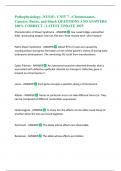Exam (elaborations)
Pathophysiology--NU545-- UNIT 7 --Chromosomes, Cancers, Burns, and Shock QUESTIONS AND ANSWERS 100% CORRECT | LATEST UPDATE 2025
- Course
- Institution
Pathophysiology--NU545-- UNIT 7 --Chromosomes, Cancers, Burns, and Shock QUESTIONS AND ANSWERS 100% CORRECT | LATEST UPDATE 2025
[Show more]



